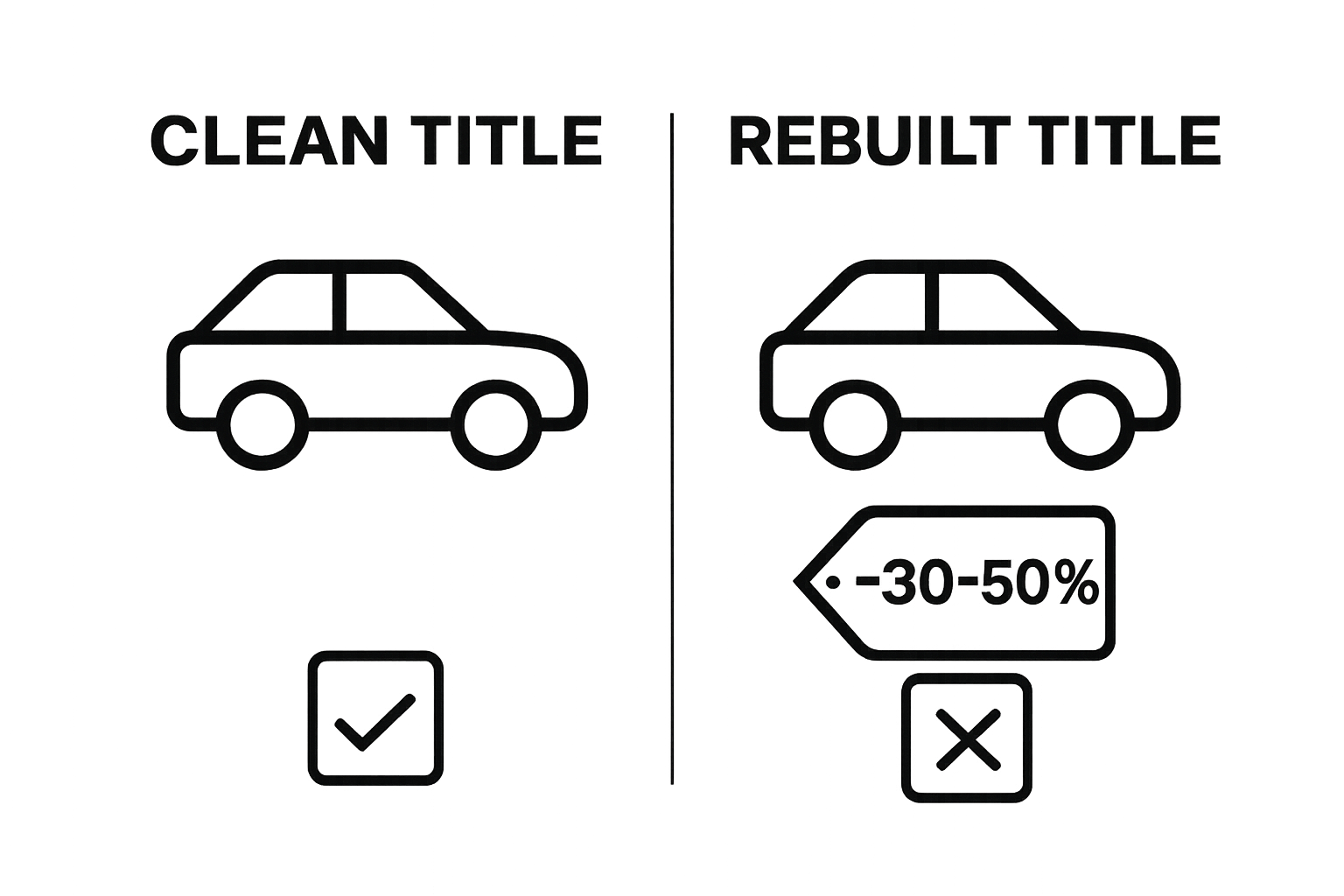Understanding If a Rebuilt Title Is Worth It
September 23, 2025
A rebuilt title might look like a warning sign to many car buyers, tied to vehicles that have seen heavy damage in the past. Yet, did you know that rebuilt vehicles often cost 30-50% less than clean title cars? Most people expect these cars to be nothing but endless trouble, but with the right repairs and inspections, they can offer dependable performance and serious savings for the right buyer.
Table of Contents
- What Is A Rebuilt Title And What It Indicates
- The Importance Of A Rebuilt Title In Car Buying
- How Rebuilt Titles Affect Car Value And Insurance
- Risks And Benefits Of Buying A Rebuilt Title Vehicle
- Real-World Considerations For Buyers In Utah
Quick Summary
| Takeaway | Explanation |
|---|---|
| A rebuilt title indicates prior significant damage. | This title shows the vehicle was previously damaged but has been restored to meet safety standards. |
| Rebuilt vehicles cost 30-50% less than clean title cars. | Buyers can find affordable options, but should consider potential long-term maintenance costs. |
| Rebuilt titles require thorough inspections and documentation. | Vehicles must pass state inspections to be reclassified, ensuring roadworthiness and safety. |
| Insurance for rebuilt vehicles can be more complicated. | Coverage may vary; buyers should check terms carefully, especially for comprehensive and collision policies. |
| Research and professional inspection are essential before purchasing. | Buyers should verify repair quality and ensure the vehicle is a reliable choice for their needs. |
What is a Rebuilt Title and What It Indicates
A rebuilt title represents a vehicle with a unique history that has been professionally restored to roadworthy condition after experiencing significant damage. When an insurance company determines a vehicle has sustained damage exceeding approximately 75% of its total value, it is initially classified as a salvage vehicle. However, after comprehensive repairs that meet state safety standards, the vehicle can be reclassified with a rebuilt title.
The Rebuilding Process
The journey from salvage to rebuilt status involves multiple critical steps:
- A professional mechanic or repair shop thoroughly assesses and repairs the vehicle
- The vehicle must pass rigorous state-mandated safety and anti-theft inspections
- A licensed inspector verifies that all repairs meet legal roadworthiness requirements
According to the Texas Department of Motor Vehicles, a rebuilt vehicle must demonstrate complete structural and mechanical integrity before receiving its new title designation.
Understanding Title Implications
A rebuilt title serves as an official documentation of a vehicle’s repair history. This designation tells potential buyers that the car:
- Has experienced significant damage in its past
- Has been professionally repaired to meet safety standards
- Carries a different market value compared to vehicles with clean titles
While some buyers might hesitate, a rebuilt title doesn’t automatically mean poor quality. Read more about understanding rebuilt title car value to gain deeper insights into this nuanced automotive category.
The key is transparency. Rebuilt titles provide a clear record of a vehicle’s history, allowing buyers to make informed decisions based on comprehensive information about the car’s past and current condition.
Below is a comparison table summarizing the key differences between clean, salvage, and rebuilt vehicle titles, helping buyers quickly understand what each designation means.
| Title Type | Definition | Market Value Impact | Insurance Availability |
|---|---|---|---|
| Clean Title | No major damage history, has not been declared a total loss | Full market value | Standard policies widely available |
| Salvage Title | Declared a total loss by insurance due to significant damage | Severely diminished (very low) | Very limited, usually not insurable |
| Rebuilt Title | Previously salvage, professionally repaired and inspected for road use | 30-50% reduction | Liability usually available; other coverages may be restricted |
The Importance of a Rebuilt Title in Car Buying
When navigating the used car market, understanding the significance of a rebuilt title can help buyers make more informed purchasing decisions. A rebuilt title is not just a label but a comprehensive indicator of a vehicle’s past, current condition, and potential future performance.
Financial Implications
Rebuilt titles significantly impact a vehicle’s financial landscape. These vehicles typically cost 30-50% less than comparable clean title cars, presenting an attractive option for budget-conscious buyers. However, this reduced price comes with important considerations:
- Lower upfront purchase cost
- Potentially reduced insurance premiums
- Decreased resale value compared to clean title vehicles
According to Consumer Reports, buyers must carefully weigh these financial factors against potential long-term maintenance expenses.
Safety and Reliability Considerations
A rebuilt title provides critical insights into a vehicle’s history and current roadworthiness. Unlike clean title vehicles, rebuilt titles indicate the car has:
- Undergone extensive professional repairs
- Passed rigorous state safety inspections
- Been deemed roadworthy by licensed professionals
Are rebuilt titles bad? While some buyers remain skeptical, many rebuilt vehicles offer reliable transportation when properly inspected and maintained.
Ultimately, a rebuilt title is a transparent record of a vehicle’s journey. It tells a story of resilience transformation and offers buyers an opportunity to own a dependable vehicle at a fraction of the traditional market price. The key is approaching the purchase with diligence, comprehensive research, and a professional inspection.
How Rebuilt Titles Affect Car Value and Insurance
Rebuilt titles create a unique ecosystem in the automotive marketplace, profoundly impacting both vehicle valuation and insurance considerations. Understanding these dynamics is crucial for potential buyers navigating the complex landscape of rebuilt vehicles.
Market Value Depreciation
A rebuilt title significantly alters a vehicle’s market value compared to its clean title counterpart. Rebuilt vehicles typically experience a 30-50% reduction in total market value, reflecting their complex history and potential future maintenance challenges. This depreciation stems from several key factors:

- Perceived higher mechanical risk
- Limited buyer confidence
- Reduced resale potential
- Complicated insurance underwriting
The economic implications extend beyond initial purchase price, influencing long-term ownership costs and potential future transactions.

Insurance Landscape
Insurance for rebuilt title vehicles presents a nuanced challenge. While many insurance providers offer coverage, the terms and conditions differ substantially from standard policies. Can you get insurance on a rebuilt title car? The answer is complex and varies by provider.
Most insurance companies will provide liability coverage for rebuilt title vehicles. However, comprehensive and collision coverage might be more restrictive. Insurers typically:
- Require detailed repair documentation
- Conduct thorough vehicle inspections
- Offer limited payout values based on current market assessment
According to the National Association of Insurance Commissioners, the key is transparency and professional documentation of the vehicle’s repair history.
Ultimately, a rebuilt title represents more than a simple label. It’s a comprehensive narrative of a vehicle’s journey, reflecting resilience, professional restoration, and the potential for continued reliable service. Buyers must approach these vehicles with informed skepticism, thorough research, and a comprehensive understanding of their unique financial and insurance implications.
Risks and Benefits of Buying a Rebuilt Title Vehicle
Buying a rebuilt title vehicle represents a complex decision that requires careful consideration of potential advantages and drawbacks. Understanding these nuanced factors empowers buyers to make informed automotive investments.
Financial Advantages
Rebuilt title vehicles offer substantial financial benefits for budget-conscious consumers. These vehicles present unique opportunities that extend beyond simple cost savings:
- Purchase prices 30-50% lower than comparable clean title vehicles
- Potential for acquiring higher-end models at more affordable price points
- Reduced initial investment with potential for reliable transportation
The Benefits of Buying Rebuilt Title Vehicles highlight the economic attractiveness of these unique automotive options.
Potential Risks and Challenges
While financially appealing, rebuilt title vehicles come with inherent risks that demand thorough investigation. Potential challenges include:
- Uncertain long-term mechanical reliability
- Potential hidden structural damage
- Complicated insurance coverage
- Significantly reduced resale value
According to Consumer Reports, buyers must conduct comprehensive due diligence before purchasing.
Ultimately, a rebuilt title vehicle represents a calculated risk. Successful ownership hinges on meticulous research, professional inspection, and realistic expectations. Buyers who approach these vehicles with informed skepticism and thorough understanding can transform potential risks into remarkable automotive opportunities.
This table organizes the primary risks and benefits of buying a rebuilt title vehicle so buyers can weigh their options more easily.
| Benefit or Risk | Explanation |
|---|---|
| Financial Savings | Rebuilt vehicles usually cost 30-50% less than comparable clean title cars |
| Lower Insurance Premium | Some insurers may offer lower liability-only premiums |
| Access to Higher-End Models | Buyers might afford vehicles or features otherwise out of reach |
| Depreciated Resale Value | Rebuilt vehicles generally have much lower resale values |
| Mechanical Reliability Concern | Past damage may result in long-term repair or reliability issues |
| Complicated Insurance | Many insurance providers restrict or limit coverage options for rebuilt title vehicles |
| Additional Due Diligence | Requires thorough research and a professional inspection before purchase |
Real-World Considerations for Buyers in Utah
Utah’s unique automotive market presents distinctive challenges and opportunities for buyers considering rebuilt title vehicles. Understanding local regulations, insurance landscapes, and market dynamics is crucial for making informed purchasing decisions.
Local Inspection and Documentation Requirements
Utah has stringent requirements for rebuilt title vehicles, designed to protect consumers and ensure roadworthiness. Buyers must navigate specific documentation and inspection protocols:
- Mandatory state safety inspection for all rebuilt vehicles
- Detailed repair documentation must be submitted to Utah DMV
- Vehicle must pass comprehensive anti-theft verification
A Smart Guide to Buying a Car in Utah provides essential insights into local automotive purchasing strategies.
Insurance and Registration Nuances
Utah’s insurance landscape for rebuilt title vehicles presents unique considerations. Local insurance providers have specific protocols for these vehicles:
- Some insurers require additional mechanical inspections
- Comprehensive coverage might have more restrictive terms
- Registration fees can differ from standard vehicles
According to the Utah Division of Motor Vehicles, consumers must be proactive in understanding these specialized requirements.
Successful rebuilt title purchases in Utah demand meticulous research, professional consultation, and a comprehensive understanding of local automotive regulations. Buyers who approach these vehicles with informed diligence can transform potential challenges into remarkable automotive opportunities.
Discover a Better Way to Buy Rebuilt Title Cars with Confidence
Shopping for rebuilt title vehicles can feel like a maze of uncertainty. The article sheds light on common struggles like unclear accident histories, mysterious repairs, and the real cost of trying to sniff out a good deal. You want the value rebuilt titles can offer and the transparency you deserve. You do not want another gamble or a costly surprise.

Step onto the road with ReVroom, the marketplace built for rebuilt title vehicles and the drivers who demand more. Every listing shows accident history and pre-repair photos up front. No need to pay for extra reports or chase down information. Save money and time while protecting yourself from questionable offers. Ready to start driving the best of both worlds? See how easy it can be to shop smarter and find your next ride today.
Frequently Asked Questions
What is a rebuilt title?
A rebuilt title indicates a vehicle that has been repaired and restored to a roadworthy condition after experiencing significant damage, such as being classified as a salvage vehicle.
How does a rebuilt title affect a vehicle’s value?
A rebuilt title can reduce a vehicle’s market value by 30-50% compared to similar cars with clean titles due to perceived higher mechanical risks and limited buyer confidence.
What are the insurance implications of buying a rebuilt title vehicle?
While many insurance providers offer coverage for rebuilt title vehicles, the terms may be different from standard policies, often requiring detailed repair documentation and potentially offering limited payout values.
What should buyers consider before purchasing a rebuilt title vehicle?
Buyers should conduct thorough research, seek a professional inspection, and weigh financial advantages against potential long-term maintenance challenges before making a purchase.
